I taught Senior English for seven years and every fall, two periods per day, I would read Ken Kesey’s One Flew Over the Cuckoo’s Nest aloud for our novel study. I liked reading out loud to the class for a few reasons: It almost guarantees every student will get through the book (inevitably some will fall asleep at some point because #Teenagers); Kesey’s writing - the characterizations, settings, and emotional impact - is truly superb and worth hearing as well as seeing on the page [though I did artfully skip some sections plus a couple choice words here & there, mainly to keep us on a timeline but also to avoid the N-word and giving students the memory of Mrs. Spencer shouting “cocksucker”]; I relished us all experiencing & discussing the story together in real time.
This means that I have read Cuckoo’s Nest 161 times since 1985, when I first encountered it with Mr. Barker in 11th grade American Lit. I can’t bring up specific details from our class discussions but I do recall feeling stunned daily by the depth & gravity of the story. In case you have only seen the 1975 film, which was generally well-cast but appallingly missed2 the true essence of the novel, the book is narrated from the point of view of “Chief” Bromden, a [presumed] schizophrenic Native American patient in a mental hospital. He has spent decades observing the staff and other patients, interpreting their actions through his personal history and mental illness so that the reader is never quite sure what is true. When Randle P. McMurphy arrives on the ward, his loud, brash demeanor disrupts the usual hushed atmosphere; his confidence with everyone, particularly the ominous Nurse Ratched, is invigorating to the docile all-male floor. Only Chief is dubious of McMurphy’s motives and worried about the effects he will have on everyone.
This might sound familiar because it’s basically how someone who has seen the movie would summarize the storyline, but the absence of Chief’s perspective3 makes for not only a different focus4 but robs the viewer of significant historical insights - in the book, we learn about Chief’s childhood with his Native father and white mother in a Chinook village on the Columbia River (he remembers Celilo Falls before they were submerged) and its connection to his thoughts & behaviors; we revisit the horrors of WWII combat and how they affect his perceptions & relationships; we see behind the scenes of hospital administration and the potentially detrimental results of hierachy & manipulation. These insights are crucial to our understanding of a story that is actually about humanity and fighting corrupt, damaging systems, not about one man’s cavalier disruption of a stifling situation. Because of Chief’s compelling viewpoint, we readers move from incredulous distrust of a hallucinating man to wholehearted belief that he is the only one who knows true things.
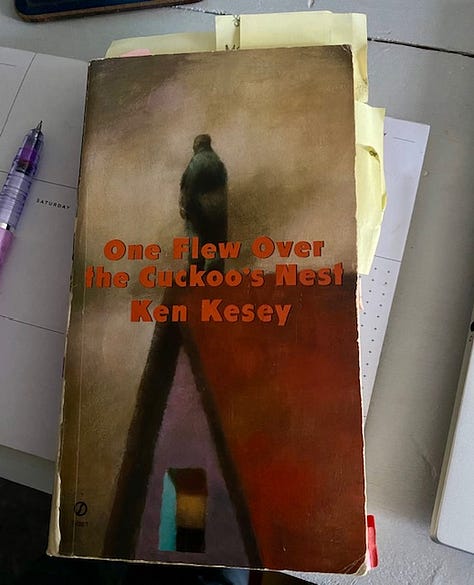
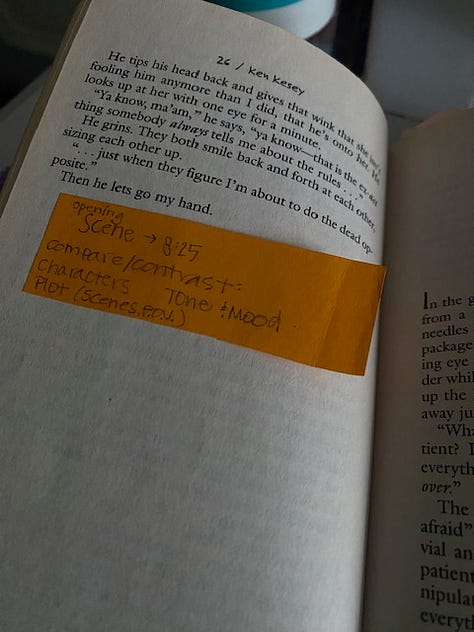

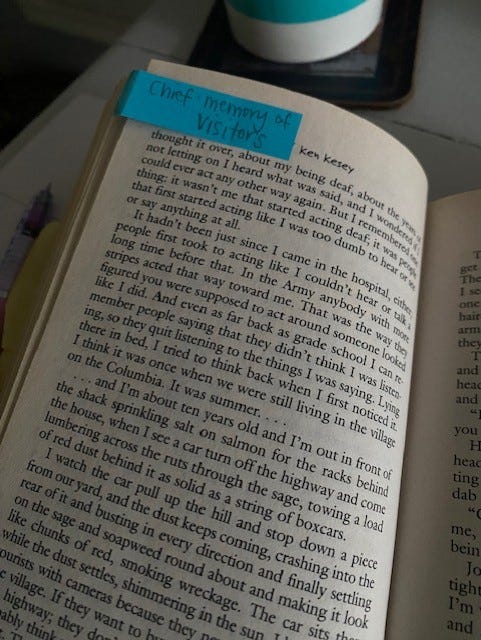
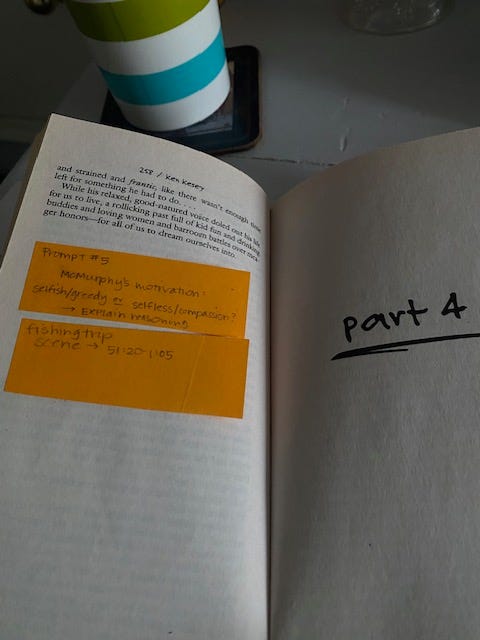
I stopped teaching Senior English in 2019. My copy of Cuckoo’s Nest reminds me of every class discussion throughout those seven years - even after 16 encounters with the novel, I saw something new each time we studied it, as students would bring their own experiences & questions & understandings to their reading/listening.
I can never pick a “favorite” book because so many titles serve me in different ways at different times, but this one comes very close to providing everything. I brought it home from my classroom5 with sticky notes intact to occupy a new space on my office bookshelf. But it might be time to come down for another reading.
If you’re questioning my math (as you should): 7 years x 2 periods/day = 14 + 1 reading during high school = 15 + 1 re-reading the summer before I started teaching it = 16.
I will die on the hill of This Book Is 1000% Better Than the Movie and have expressed this passionately to many unsuspecting folks, including actor Christopher Lloyd whose character Taber in the novel was only a flashback symbolic parallel to McMurphy, not existing in the same timeline. Mr. Lloyd graciously acknowledged my point without comment.
For extra credit, check out this deep dive into the importance of Chief’s perspective.
I enjoy an unhinged Jack Nicholson as much as anyone, but McMurphy was written by Kesey to be a touch more subtle & clever, and ultimately more thoughtful than the movie portrayal.
I paid for it…not school property, I promise.


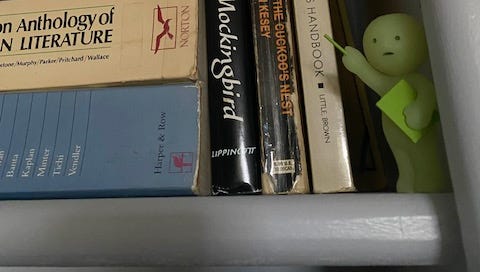



Thank you for this wonderful insight! I have never read this book- which surprises me. Of course I have seen the movie multiple times.... I am inspired to read this beloved book - SOON!
Thank you for the deep dive article! I’ve only seen the movie probably way back not too long after it was released. We possibly watched a clip from it in a Native Americans in Film class in my undergrad years. I’ve never read the book and didn’t realize it was written from the perspective of a Native American. Thank you for this!